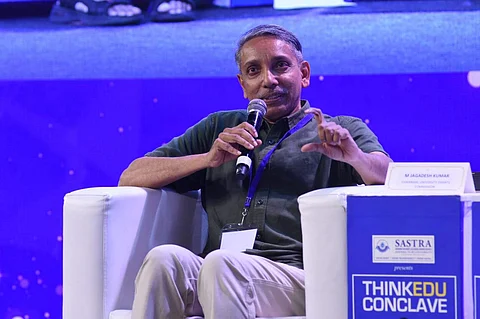

Regulators should serve as facilitators, aiding universities in maximising their freedom within the existing frameworks. This approach ensures that we embark on a new trajectory, breaking away from the constraints of our rigid education system, said M Jagadesh Kumar, chairman of the University Grants Commission (UGC), while speaking on Day 1 of the 13th ThinkEdu Conclave 2024, presented by SASTRA University, in Chennai on Wednesday.
Speaking in a session on “Regulator Bodies: Acts in Action,” chaired by S Vaidhyasubramaniam S, vice-chancellor of SASTRA University, Kumar highlighted the need for universities to utilise their freedom for a more flexible and innovative education system.
Discussing the National Education Policy (NEP) 2020, Kumar noted its alignment with G20 resolutions, emphasising foundational literacy, digital technology integration, relevance in the workforce, and cross-border collaboration. He stressed the urgency of implementing these reforms, considering their relevance not just to India but to a larger global population.
“We aim to enhance foundational literacy and numeracy among students, leverage digital technology in education, make education more relevant to the future workforce, and foster cross-border collaboration in higher education. This spans research, innovation, capacity, culture, coordination, leadership, content, curriculum, connectivity, infrastructure, and cost sustainability.”
Kumar urged a departure from the rigid educational system, citing the example of Jagadish Chandra Bose’s transition from wireless communication to biology. He called for regulators to facilitate innovation and empower institutions to address challenges in implementation.
“The university system, entrenched in a rigid educational framework for the past 70 years, is now at a juncture to embark on a new path. While acknowledging concerns such as infrastructural and funding issues in implementation, it is imperative for our education system to embrace innovation. This underscores the necessity for regulators to adopt a facilitative role, steering clear of micromanaging institutions,” said the UGC chairman.
Addressing NEP tools such as the Academic Bank of Credits, multiple entry and exit options, National Credit Framework, and multidisciplinary education, Kumar underscored the central objective of NEP 2020—empowering students as lifelong learners. He encouraged a mindset where setbacks are viewed as opportunities for growth.
Speaking on UGC's role, Kumar highlighted the flexibility it allows students to switch disciplines based on demonstrated competency. “Irrespective of your prior degree or school curriculum, the flexibility exists for individuals to enter any discipline, contingent upon the demonstration of competence. The National Education Policy (NEP) recommends the creation of the Higher Education Commission of India (HECI). Once established, these regulatory entities can collaboratively devise common reforms," emphasised the UGC chairman.
Kumar expressed strong advocacy for granting independence to academic institutions. He clarified that UGC regulations serve as a broad framework necessary for establishing educational standards, ensuring that institutions possess significant freedom and autonomy. Despite this, he acknowledged a shortfall in fully leveraging this autonomy, prompting a call for educational leaders to embrace innovation and adventurous approaches. Additionally, he encouraged educational institutions to harness the potential of digital technology, making high-quality education accessible to students affordably and conveniently.
Kumar advocated leveraging digital technology to make high-quality education accessible and affordable. He discussed the goal to train 50 lakh teachers in the higher education system in the next year under the Malviya mission teacher training centres.
“We are in the process of collaborating with the capacity-building commission to formulate a comprehensive training program for our administrative staff. The focus will be on enhancing competency, fostering proficiency in utilising new technologies, and refining interpersonal relations. Our aim is to impart essential soft skills to the administrative team, and we are actively developing a plan to achieve this,” said Kumar.
On the Common University Entrance Test (CUET), Kumar praised its role in replacing multiple entrance examinations, providing flexibility, and reducing the burden on students. “The CUET, based on the Class 12 syllabus, aims to streamline the admission process and offer more opportunities for students across various universities in the country,” he said.
